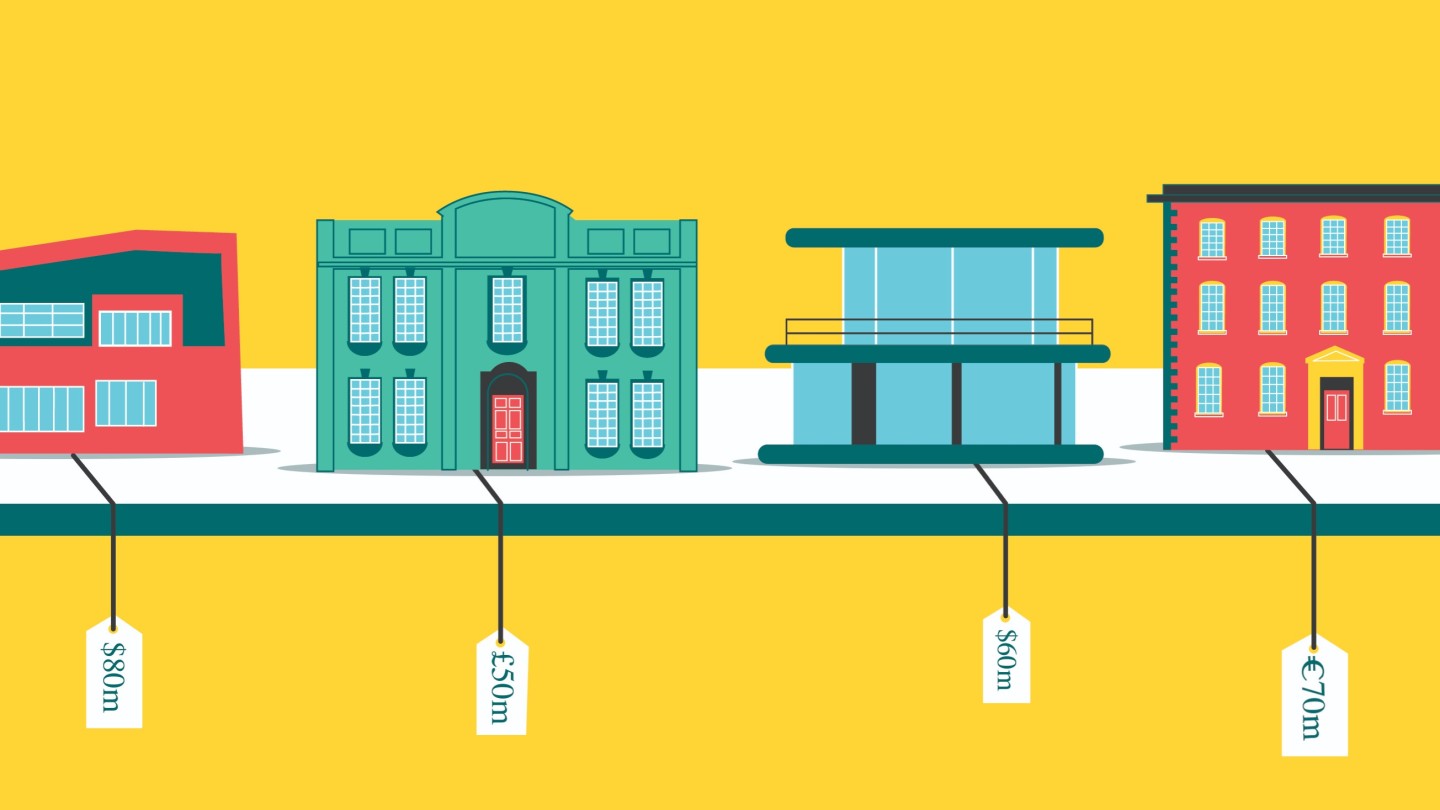How the super-rich buy their homes

Roula Khalaf, Editor of the FT, selects her favourite stories in this weekly newsletter.
Earlier this year, mortgage broker Paul Welch arranged the financing for a Singaporean client who was buying a home in London for £7m — and putting down no money whatsoever as a deposit.
“We used existing assets such as individual shares in addition to the property itself,” says Welch, who runs largemortgageloans.com and arranged the mortgage with a 1 per cent interest rate — terms that most UK homeowners would consider too good to be true.
For years the super-rich, advised by a suite of lawyers, accountants and bankers have taken mortgages — often reaching up to 100 per cent of the value of the property — on the world’s priciest homes. The majority of loans are interest-only; most are never paid off unless the home is sold; increasingly, when the home is inherited, the next generation will take out a comparable loan. The money saved can then be shuffled around the world in search of the best tax deal and the biggest investment gains.
With annual net income over £300,000 or net assets over £3m, Welch’s clients enjoy a wider range of options than other UK mortgage customers. Borrowing the money — and buying in London — brings benefits. Many are resident non-doms (RNDs), meaning they live in the UK but declare their domicile elsewhere so are not taxed on money earned outside the country, so long as they don’t bring it in.
“It’s a no-brainer,” says Mark Davies, a London tax adviser to the super-rich — most of them non-doms. “[Borrowing] means your money is working in two different places to generate wealth. You own the house in London [which may increase in value] and you also invest the money offshore.”
For a super-rich individual, the combined value of multiple home loans can extend to the hundreds of millions, with international private banks typically lending the money. Often they clear the borrowing quicker than a high street bank would, helping clients snap up a bargain.
“If you find something you like, you may want to buy it in a hurry, whether it’s in the south of France, the Caribbean or Miami,” says Roddy Boulton, a private banker for Deutsche Bank in London.
Those who offer home finance, or arrange it, pursue potential clients at trade fairs, where the very wealthy shop for superyachts or private jets, or events where they enjoy their pastimes. Welch, who also arranges finance for yachts and jet purchases, reckons he has received £500m of leads through giving out branded sunglasses cleaning cloths from his stall at the Monaco Yacht Show.
He is also a regular at Geneva’s European Business Aviation Convention and Exhibition. Classic and supercar events such as the UK’s Salon Privé at Blenheim Palace and the Goodwood Revival are also popular mixing grounds, as is the Paddock Club VIP access at the world’s Formula 1 races.
Private banks may host events at the World Economic Forum at Davos, luring current and prospective clients with celebrity speakers. Financiers make sure they keep advisers to the super-rich — including lawyers, accountants and tax advisers — up to date with what they can offer. Staff of the super-rich visit ultra-high net worth conventions to stake out the services on offer.
“And people talk,” says Davies. “One billionaire might introduce another: ‘These guys are good [for arranging a mortgage], try them’; ‘Credit Suisse were fantastic for this; I used UBS for that and they were all right.’ ”
Mortgages for the super-rich typically cost banks more to administer than those for normal customers — partly because their incomes are rarely all from typical sources such as a salary, so take time and effort to fathom. But if they spy lucrative business down the line — such as managing share and bond portfolios or selling clients new shares as part of initial public offerings — bankers may offer them at knockdown prices.
“Lending can often be a door-opener,” says Boulton.

A private banker at the Monaco office of a big global bank, who asked not to be named, says he would lend money at a loss if this was outweighed by revenue from other services. Recently he sought to lure a client worth $3bn from a competitor bank, offering him a loan on a €60m home purchase at a rate so low that he knew it would be rejected by his lending department. The prospect still refused because — the banker believes — the terms from the existing bank were better.
Earlier this year, Welch secured a £45m mortgage from a private bank on a £50m London home for a client. “On day one [there was] nothing but a gentleman’s agreement that they would develop a wider relationship. Banks will do whatever they want to do if they want the client,” he says.
Melissa Cohn, a specialist US mortgage broker who covers New York, Florida and the Hamptons for William Raveis Mortgage, has arranged $400m worth of home loans this year, for sums of between $3m and $19m. She says typical rates for these — most of which are interest only, with 30-year terms — are now between 2.5 and 2.9 per cent. Recently, falling interest rates have led her clients to increase the amount of borrowing on their homes, releasing equity to invest in their own businesses or the stock market, where they believe they will get returns that are higher than the cost of the loans.
“At the beginning of 2020, when rates were at 3.5 per cent or 3.75 per cent, my clients would [borrow] 50 per cent to 75 per cent loan to value. Now, everyone wants to get as much as they can get. The attitude is: why wouldn’t you and you’re dumb if you don’t.”
Private bankers say that while most clients still favour variable rate loans, an increasing number are considering fixed-rate mortgages in anticipation of future interest rate rises.
Several UK high street banks will currently lend mortgages of up to £10m — NatWest’s was the best rate at this level in late October — but borrowers must be able to demonstrate clear historical income to show they can afford the repayments.
“The high street banks are criteria led — they have the lowest rates and fees but no negotiating of the terms and lower flexibility,” says Welch.
This doesn’t disqualify all super-rich — a hedge fund manager with a regular salary and a clear history of annual bonuses, for example. But often their unconventional incomes see them refused by mainstream lenders, whose affordability criteria they fail to meet, pushing them to private banks.
“They may be asset rich but they only take [as income] what they need to live off. The private banks look more at the bigger picture, such as retained profits in a business, private equity investments, a stock portfolio, or fine art,” says Jonathan Harris of mortgage broker Anderson Harris in London. For many of her clients, Cohn will therefore go to smaller local banks, those that specialise in savings and loans, or credit unions (not-for-profit organisations owned by those who use their services).
“[This route] is for people who can fulfil 90 per cent of lenders’ guidelines but have a few exceptions — perhaps a banker whose income grew exponentially last year so their two-year income average doesn’t reflect this. Or they want to own their home through an LLC [limited liability company] — maybe a celebrity who wants to keep their identity private,” she says.

For less conventional incomes — for example, a founder of a start-up that showed a loss last year but is now grossing $100,000 a month, she says — she will try non-bank lenders such as Sprout and Lendsure.
In the US, even though Covid saw lending rates fall, it also weakened the terms Cohn could get clients on mortgages: LTV ratios and maximum loan amounts fell and clients needed better credit scores with some of the restrictions still in place.
The precise tax benefits associated with borrowing money to buy expensive homes vary from country to country. In France and the UK, buying homes with borrowed money reduces the value of the home subject to inheritance tax. And the mortgaged portion of a home’s value is exempt from France’s wealth tax. “There, clients will be advised by their lawyers to buy homes entirely with borrowed money,” says the Monaco banker.
In the US, taxpayers can deduct interest paid on the first $750,000, across up to two properties, from their federal tax bill. If the mortgage was taken out before December 15 2017, this amount increases to $1m. UK residents, including resident non-doms, are exempt from capital gains tax paid on their main UK home when they sell it.
Besides the tax benefits of basing in the UK, the prospect of home price increases is part of the appeal of buying a home for Davies’s clients. Steve Goodrich, head of research and investigations at Transparency International UK, says that the same feature appeals to criminals, who buy homes through companies to conceal their identities.
“UK property provides an attractive investment environment for those seeking to save taxes or a safe haven for suspect wealth. Currently, it’s far too easy to hide who controls substantial residential assets behind opaque corporate structures, often registered in one of Britain’s secretive offshore financial centres,” he says.
Record-low interest rates and the high value of homes owned by baby boomers means the super-rich are not the only ones looking to max out their home borrowing when they can afford not to.
A growing number of older equity-rich homeowners in the UK are taking out loans to supplement pension income, gift deposits to family members or buy second homes. Lending to over 55s is growing fast, led by increases in equity release mortgages, where the mortgage has no end date and is typically paid off when the mortgagee dies and the home is sold.

In the three months to December 2019, 12,520 new equity release mortgages were taken out by over-55s, up from 6,130 over the same period in 2014, according to UK Finance.
As with RNDs, part of the appeal for this group is the tax advantage, since the mortgaged value of a home is exempt from the 40 per cent inheritance tax levied on a UK estate above £325,000.
“For our parents’ or grandparents’ generation you were stigmatised if you had a mortgage in later life — it was a triumph when you paid it off. Now people realise you may create massive inheritance tax liabilities,” says Harris.
He says typical interest rates on equity release mortgages are now between 2 per cent and 3 per cent, compared with 5 per cent to 7 per cent five years ago, with many banks offering lower charges for early repayment and the ability to pay interest during the life of the mortgage rather than having it compound.
Five years ago, one in 20 of the mortgages Harris arranged was to older borrowers seeking equity release; now the proportion is one in five, with a “massive pick-up” in clients over 70. But with the majority seeking mortgages for between £200,000 and £1.5m, it’s unlikely you’ll see Harris pitching for business at the Monaco Yacht Show.
Follow @FTProperty on Twitter or @ft_houseandhome on Instagram to find out about our latest stories first
Comments